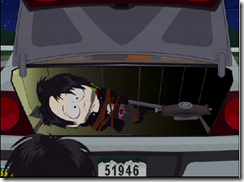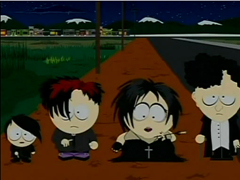Everything Must Go
Rated R
97 minutes
Director: Dan Rush
Writers: Dan Rush, Raymond Carver (short story "Why Don't You Dance")
Will Ferrell, Rebecca Hall, Christopher Jordan Wallace, Michael Peña
If we're gonna send him somewhere, it should be the more horrible, most miserable place on Earth…….. Scottsdale.
-South Park, Ep. 1214 "The Ungroundable"
Originally a minimalist, short story, only the barebones of film were in place. Most of this movie was written by a screenwriter. Nonetheless, the rest of the story was true to the author and his works.
I see this as more of a dramatic piece, than a comedy. Yes, it’s funny in places, and it is definitely funnier than Bewitched. But a dramatic movie needs funny moments. Otherwise, it becomes a complete farce.
The protagonist in this movie is comparable to Willy, in The Death of a Salesman. Except this movie does not end tragically: its ending is more bittersweet.
The movie centers on these three characters:
| Nick Halsey (Ferrell) Kenny Lotus (Wallace) Samantha (Hall) |
Christopher Jordan Wallace: does this name sound familiar? I will give you a hint:
You're nobody,
'til somebody,
kills your father
Our story begins in the sunny suburbs of Scottsdale, Arizona. We watch an ordinary, middle-aged man, go about his day.
Nick Halsey- The movie starts him getting fired from his job. You never really know the real reason; it just does not seem to be completely justified. Nick drives home from work to find all his belongings in the front yard. None of his keys work, his wife is left him. All of this on the same day.
Everything Must Go starts out like Falling Down. Except, he doesn’t go around smacking people with a baseball bat. All his rage is internalized, and after several months of sobriety, he relapses. Credit cards are canceled, he spends most of his remaining cash on PBR.
He sleeps on a Lay-Z-Boy recliner, in his front yard. The electricity did not get turned off. So he can keep his beer cold in the mini-fridge, and reheat leftovers on his George Forman Grill.
Naturally, this attracts attention from local authorities. Lucky for him, his AA sponsor is a local detective. Det. Frank Garcia Peña keeps Nick from going to jail. Apparently, you can not live in your front yard...legally; not in a town this boring.
Holding a yard sale, that the only legal recourse he has is. Here we have salesman, selling everything he owns. Everything must disappear within a few days.
The contents of his life are laid before him. They are a constant reminder of where he has been, where he is now, and where he is going. Surprisingly, Nick really is not ashamed or embarrassed by any of this.
Kenny Lotus- A heavy set boy, 12 or 13 years young. His mom is the caretaker of an elderly lady nearby. Kenny is left on his own, riding his bike for hours on end. With his father out of the picture, Kenny is desperate for a father figure.
After failing to find his car keys, Nick borrows Kenny’s bike to pick up more beer. During this time, his company car was repossessed.
This is the start of a friendship/business partnership. Kenny agrees to help Nick with his yard sale. In exchange, Kenny gets minimum wage, and someone to teach him to play baseball.
Samantha- A photography teacher, she is several months pregnant, and is new to the neighborhood. Her husband is out of town on business. Samantha possesses an extraordinary level of patience. She reaches out to help a man who lost his wife, at a time she is plagued with doubts on the future of her own marriage.
The real genius of this movie is its simplicity. An original story, with depth and meaning. And the way they interact with one another–it is done in an ultra-realistic fashion.
This film should have been a little longer. Aside from that, there is really not much I can complain about. You should watch this at least a couple of times.
”…Before I built a wall I'd ask to know
What I was walling in or walling out,
And to whom I was like to give offence…”
“…He moves in darkness as it seems to me,
Not of woods only and the shade of trees…”
-Robert Frost, Mending Wall in: North of Boston (1915) (2 Excerpts)
Final Verdict: 94 out of 100






